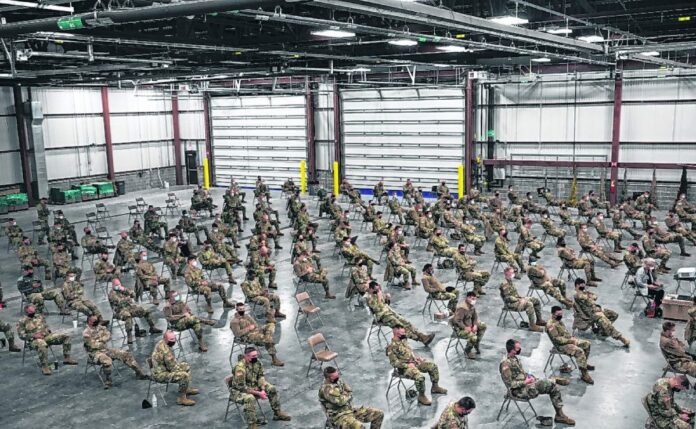
Bartholomew County’s long-term care facilities are awaiting the arrival of National Guard units after Indiana Gov. Eric Holcomb activated the Army reserve force in response to sharp increases of coronavirus cases in nearly every county in Indiana.
On Monday, nearly 400 soldiers from the Indiana National Guard will be deployed to 133 of the state’s hardest hit long-term care facilities. By mid-November, 1,350 Guard members are expected to be at 534 long-term care facilities across the state.
The Guard will help the facilities with infection-control protocols, routine health screenings, data entry, among other tasks, said Brig. Gen Dale Lyles, the adjutant general of the Guard, on Wednesday.
The group of soldiers that will be deployed Monday underwent training at Camp Atterbury near Edinburgh on Friday.
[sc:text-divider text-divider-title=”Story continues below gallery” ]
The move, announced by Holcomb on Oct. 21, aims to protect the state’s “most vulnerable” population, elderly people and those with serious health problems living in nursing homes and other facilities who are among the most at-risk from severe illness due to the coronavirus.
Just under 1% of Indiana’s population lives in long-term care facilities, but at least 57% of Indiana’s roughly 4,000 COVID-19 deaths are linked to long-term care facilities, according to the Indiana State Department of Health.
At least 219 long-term care residents in Bartholomew County have tested positive for COVID-19 over the course of the pandemic, resulting in at least 40 deaths, according to state figures. Additionally, at least 75 long-term care staff in Bartholomew County have tested positive for the virus.
Nearly 36% of people hospitalized with COVID-19 at Columbus Regional Hospital have been at least 70 years old, the hospital said. Statewide, nearly 70% of hospitalizations are linked to long-term care facilities and 47% of hospitalized patients have been 70 or older, Holcomb said.
“It’s just critical that we do everything we can to help bring that number down, not just to save lives, but also to save valuable resources as well,” Holcomb said on Wednesday. “Our hospitals are under a tremendous amount of pressure.”
Local uncertainty
Currently, it is unclear how many Guard members will be deployed to facilities in Bartholomew County or when exactly they will start taking up their posts. Representatives of several local facilities said they had not yet received details from the National Guard.
Four Seasons Retirement Center, a skilled nursing facility located at 1901 Taylor Road, is expecting two Guard members to be stationed at the facility during the third round of deployments in mid-November, but had not received any direct communication from the National Guard as of Thursday afternoon, said Rebecca Stenner, Four Seasons executive director.
Stenner said Guard members may help facility staff with infection prevention and control measures, including daily screenings of staff and visitors; assist in testing patients, residents and staff for the virus; reporting test results to county, state, and federal government agencies; and assisting with cleaning and disinfecting common areas.
A total of 38 residents at Four Seasons have tested positive for COVID-19 over the course of the pandemic, resulting in the deaths of 11 residents, according to state figures. Four Seasons has not reported any cases of COVID-19 among staff or residents since Aug. 2.
“We at Four Seasons want to remind everyone to keep washing their hands, wear masks and practice social distancing,” Stenner said. “The Bartholomew County community can help our seniors in long-term care facilities by taking these measures to slow the spread of the virus in the community.”
Officials at Keepsake Village of Columbus, a nursing home residential facility located at 2564 Foxpointe Drive, also said they had not had any direct contact with the National Guard as of midday Thursday, but were looking forward to having them in the facility, said Heather Angel, business director.
Keepsake Village of Columbus has reported 16 confirmed COVID-19 cases among residents and fewer than five deaths since the pandemic started, but no cases since Sept. 11, according to state records. State health officials said they suppress death and case figures that are lower than five, citing privacy laws.
Representatives from Columbus Transitional Care and Rehabilitation, 2100 Midway St., and Willow Crossing Health and Rehabilitation Center, 3550 Central Ave., which are both operated by Magnolia Health Systems of Indianapolis, did not respond to questions about how many Guard members they anticipated receiving or how the two facilities might utilize the additional help.
Columbus Transitional Care has reported 113 positive cases among residents, resulting in 29 deaths over the course of the pandemic, according to state figures. Willow Crossing has reported 29 cases among residents but no deaths.
Columbus Transitional Care’s numbers are likely higher than because it has housed a regional COVID-19 unit, with patients being transferred from other facilities and counties.
Rising cases
The activation of the Indiana National Guard came as a new wave of coronavirus infections sweep the state, with Indiana posting record numbers of cases and hospitalizations soaring to levels not seen since April.
A total of 1,733 people in Indiana were hospitalized with confirmed or suspected COVID-19 infections on Thursday, according to the Indiana State Department of Health. That’s more than double the 731 people hospitalized on Sept. 12 and the highest since April 13, when 1,799 people were hospitalized across the state.
Cases of COVID-19 linked to long-term care facilities in Indiana have started to rise again, including in Bartholomew County, according to state health officials.
There were 23 confirmed cases of COVID-19 reported at long-term care facilities in Bartholomew County from Oct. 1 to Oct. 21, compared to 12 during the entire month of September.
All but one of the cases in October were reported at Columbus Transitional Care. The other case was reported at Willow Crossing on Oct. 17, according to state figures.
CRH officials have been in frequent communication with local long-term care facilities, sharing protocols, testing and other information since the onset of the pandemic, said Judy Clipp, specialty lead nurse for the office of care coordination at Columbus Regional Health and CRH’s liaison with local area nursing homes.
“All of them reach out to me if they have a positive resident or a positive staff,” Clipp said, adding that she will continue to speak to all of the local facilities at least twice a week.
“We’ll ramp it up if there’s something that comes up.”
Concerns about winter
With winter looming, the rise in cases across much of the United States is raising concerns among healthcare professional around the country, including at Columbus Regional Health.
Almost every county in Indiana has seen a rise in cases in recent weeks, including Bartholomew County, where 135 positive tests were reported from Oct. 21 to Oct. 28, compared to 140 during all of last month.
However, CRH does not just serve patients from Bartholomew County.
CRH’s service area includes Bartholomew, Brown, Decatur, Jackson, Jefferson, Jennings, Johnson, Ripley, Scott and Shelby counties. The local hospital also sees patients from several other counties.
Currently, nearly every county in CRH’s service region is seeing spikes in COVID-19 cases.
There were 1,209 confirmed cases of COVID-19 across the entire service region, including 392 among people ages 60 or older and 139 ages 80 and up from Oct. 21 to Oct. 28, according to state health records.
By comparison, there was a combined total of 983 confirmed cases of the coronavirus across the 10-county region during the entire month of September.
CRH officials said they have been planning how to handle a potential surge COVID-19 patients and influenza patients and the strain that could place on the hospital’s resources and staff, particularly if a major portion of CRH’s workforce were to be infected or need to quarantine.
As of Oct. 20, 66 CRH staff members had tested positive for COVID-19 since March, the hospital said.
Currently, CRH is adequately staffed but officials have been reaching out to external agencies and other staffing avenues as potential sources for additional nurses in case more staff is needed to handle a surge, said Staci Glick, vice president of patient care services and chief nursing officer, at Columbus Regional Health
“We want to be as as best prepared as we can be, but we have to acknowledge that we want to make sure we have enough staff, and we don’t know you know what this is going to look like. We haven’t been seeing flu yet,” Glick said.
Additionally, CRH has started to revisit a series of plans put in place in the spring on how to handle a potential surge in patients, including turning the hospital’s post anesthesia care unit into an extension of the ICU, as well as other options, officials said.
However, the plans may need to be tweaked, as Holcomb temporarily ordered hospitals to halt elective and non-urgent procedures in the spring, which freed up space and resources. Currently, it’s unclear if he will do the same in the fall or winter.
“What we really are trying to plan now is what do we need to do to continue to provide what you might call usual care while planning for a potential surge in COVID patients, a surge in influenza patients or perhaps a surge in both,” said Dr. Thomas Sonderman, vice president and chief medical officer at Columbus Regional Health.
CRH officials are urging local residents to take the virus seriously and follow public-health guidance aimed at mitigating the spread of COVID-19.
“If the population relaxes on masking, distancing and hand washing, that’s going to result in a dramatic increase in cases, which really puts us at risk,” Sonderman said. “Generally, we have the adequate number of beds, personal protective equipment, you know, and the like. But beds don’t take care of patients, people take care of patients, so staffing is a big concern.”




